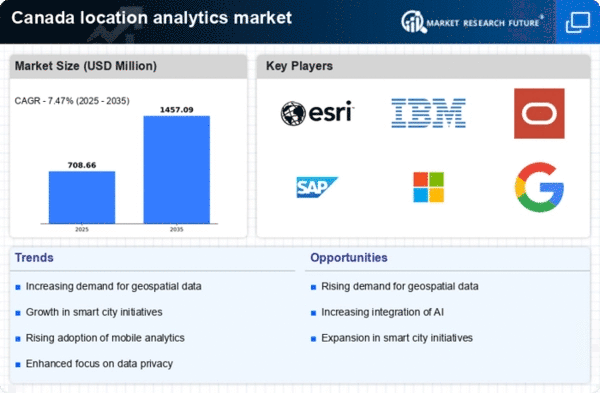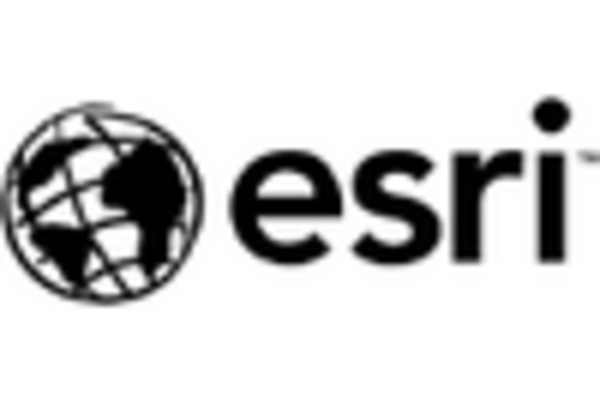Expansion of Smart City Initiatives
The location analytics market is significantly influenced by the expansion of smart city initiatives across Canada. Municipalities are increasingly adopting location-based technologies to improve urban planning, transportation management, and public safety. For instance, cities like Toronto and Vancouver are implementing smart infrastructure that utilizes geospatial data to enhance city services. This trend is expected to drive the location analytics market as local governments seek to optimize resource allocation and improve citizen engagement. The Canadian government has allocated substantial funding for smart city projects, which is likely to create new opportunities for location analytics providers. As urban areas continue to grow, the demand for innovative solutions that leverage location data will become even more critical, thereby fostering market growth.
Rising Demand for Real-Time Data Insights
The location analytics market in Canada is experiencing a notable surge in demand for real-time data insights. Businesses across various sectors, including retail and logistics, are increasingly leveraging location-based data to enhance operational efficiency and customer engagement. According to recent studies, approximately 70% of Canadian enterprises are prioritizing real-time analytics to make informed decisions. This trend is driven by the need for timely information to respond to market changes and consumer behavior. As organizations recognize the value of location intelligence, investments in advanced analytics tools are expected to rise, further propelling the growth of the location analytics market. The integration of real-time data capabilities allows companies to optimize their supply chains, improve service delivery, and ultimately enhance customer satisfaction.
Growth of E-Commerce and Delivery Services
The rapid growth of e-commerce and delivery services in Canada is a key driver for the location analytics market. With online shopping becoming increasingly popular, businesses are utilizing location analytics to optimize their delivery routes and enhance customer experience. Reports indicate that e-commerce sales in Canada have reached over $40 billion, prompting retailers to invest in location intelligence solutions. By analyzing geographic data, companies can identify optimal delivery zones, reduce transportation costs, and improve service times. This trend is likely to continue as consumer preferences shift towards faster and more efficient delivery options. Consequently, the location analytics market is poised for growth as businesses seek to leverage data-driven insights to stay competitive in the evolving retail landscape.
Emergence of Location-Based Marketing Strategies
The emergence of location-based marketing strategies is reshaping the landscape of the location analytics market in Canada. Businesses are increasingly utilizing geolocation data to target consumers with personalized marketing campaigns based on their physical location. This approach has proven effective in driving customer engagement and sales. Studies suggest that location-based marketing can increase conversion rates by up to 30%. As companies recognize the potential of location intelligence to enhance their marketing efforts, investments in analytics tools are expected to rise. This trend is likely to create new opportunities for location analytics providers, as businesses seek to harness the power of location data to reach their target audiences more effectively.
Increased Investment in Infrastructure Development
The location analytics market is benefiting from increased investment in infrastructure development across Canada. Government initiatives aimed at enhancing transportation networks, utilities, and public services are creating a demand for location-based analytics. For example, the Canadian government has committed billions of dollars to improve roadways and public transit systems, which necessitates the use of geospatial data for effective planning and execution. This investment is likely to drive the adoption of location analytics tools among construction and engineering firms, as they seek to optimize project management and resource allocation. As infrastructure projects become more complex, the reliance on location intelligence will grow, further stimulating the location analytics market.
















